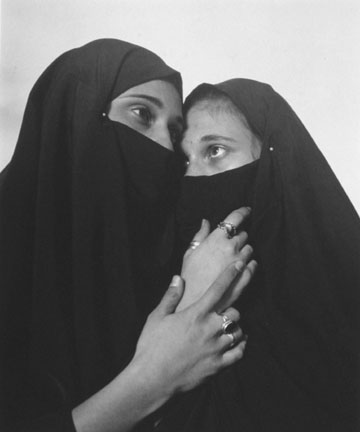About the Photographer
Serrano, Andres
American, b. 1950 New York City, NY
Andres Serrano is best known for his place, along with Robert Mapplethorpe, at the center of the 1989 controversy over public funding of the arts. Serrano received an individual artist grant from the National Endowment for the Arts (NEA) in 1986, and subsequently his photograph Piss Christ (1987), in which a Christ figurine is submerged in the artist’s urine, was invoked as an example of blasphemy and obscenity. In the 1980s Serrano began to make large tableau photographs dealing with Catholic symbolism and, in reaction to the growing AIDS epidemic, employing bodily fluids like blood and semen. Led by Senators Alfonse D’Amato and Jesse Helms, the NEA controversy culminated in 1989 with Senator D’Amato tearing up a reproduction of Piss Christ on the floor of the Senate. The battle over NEA funding continued in the 1990s with the culture wars, eventually leading to the elimination of NEA individual artist grants. Serrano’s work continued to focus on subjects traditionally considered objectionable and socially extreme, including portraits of Ku Klux Klan members and close-ups of corpses in the morgue. In depicting a collision between the sacred and profane and photographing often abject subjects in beautiful light and color, Serrano questions the notion of something being socially unacceptable.
Istanbul (Sisters) (1996), in the collection of the MoCP, continues Serrano’s longstanding interest in religious symbolism and his investigations of the politicization of the human body. The photograph depicts two women veiled in the Islamic tradition of hijab. Rather than expressing an explicit political position, the photograph quietly challenges viewers to ponder religious values and cultural assumptions. The title, Istanbul (Sisters), transforms the implications of the sisters' concealing attire by indicating that the portrait's context is Turkey's capital. Officially a secular state, Turkey has prohibited women to wear headscarves in public buildings and universities since 1980. Thus, their attire may be a deliberate choice or defiant expression of faith rather than an imposed social or religious obligation.
America (Jewel-Joy Stevens, America's little Yankee Miss) (2003), also in the collection of the MoCP, concerns choice of costume as well. Depicted with saturated color and ranging from the child beauty pageant winner to a postal worker, a pimp, a Holocaust survivor, and celebrities, each of Serrano’s subjects in his America series chose his or her outfit for the portrait session, resulting in a strange typology of America. The monograph Andres Serrano: America and Other Work (2004) places these portraits in deliberate juxtapositions, setting up visual conversations between subjects who, in Serrano’s words, “would not only not know each other but would be completely unable to relate to one another.†The print in the collection of the MoCP forms part of the America: Now and Here portfolio (2009), also containing work by Lyle Ashton Harris, Ross Bleckner, Chuck Close, Eric Fischl, Ralph Gibson, April Gornik, Sally Mann, Vik Muniz, Lou Reed, David Salle, Laurie Simmons, and Bill Viola.
Born in 1950 in New York into a Catholic family, Serrano is the son of an Afro-Cuban mother and Honduran father. In 1967, at the age of 17, he attended the Brooklyn Museum School and studied painting for two years before turning to photography.. In 1985 Serrano participated in the National Studio Program at P.S.1 Contemporary Art Center (now MoMA PS1) in Long Island City, NY. He is the recipient of numerous awards, and his work has been exhibited extensively nationally and internationally. Monographs include Andres Serrano: Body and Soul (1995), A History of Andres Serrano / A History of Sex (1997), Andres Serrano: Placing Time and Evil (2000), Andres Serrano: Works 1985-2002 (2003), and Andres Serrano: El Dedo en la Llaga (2010).


